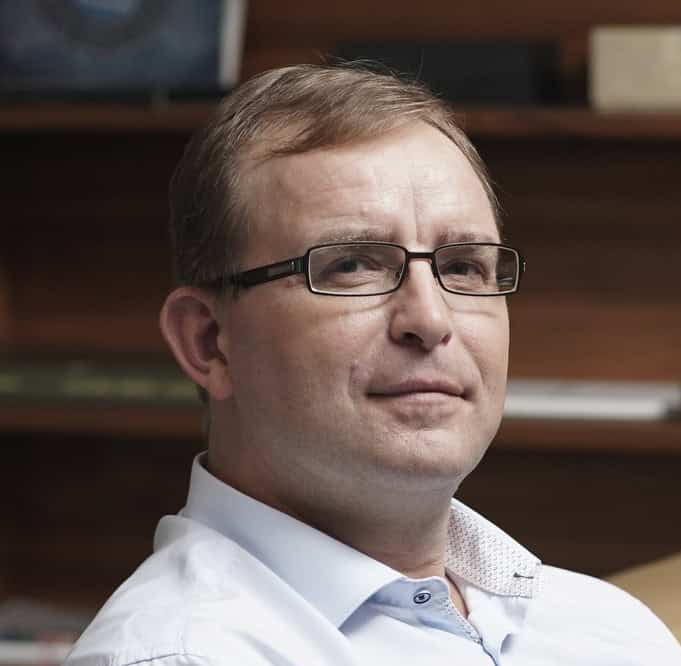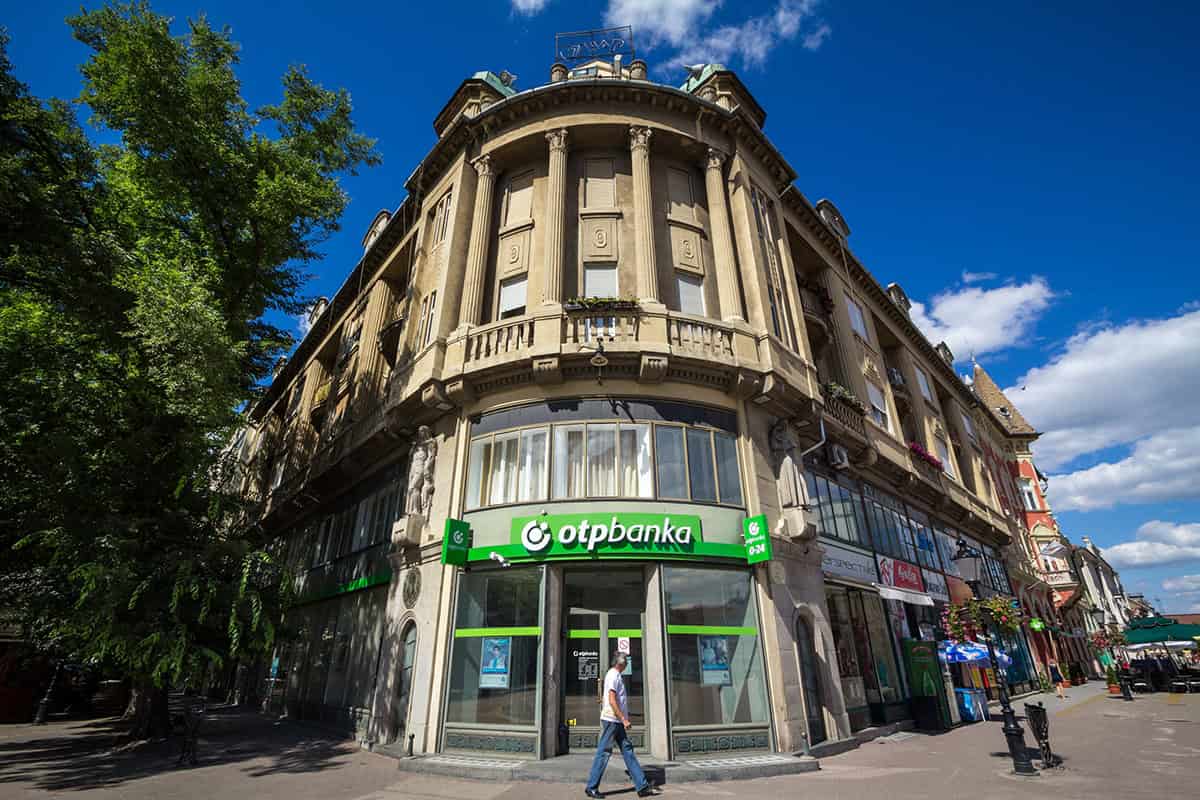With war in their midst and a challenging macroeconomic environment regionally and globally, it wasn’t an easy year for banks operating in Central and Eastern Europe (CEE). The Russian invasion of Ukraine continued through its second year with no signs of subsiding. Meanwhile, interest rates throughout the developed world remained at multidecade highs.
Yet, for the region overall, economic growth remained solid. And, encouragingly, most banks saw rising demand for financial products, from vanilla savings accounts to more-sophisticated instruments. Global Finance’s Best Banks in CEE for 2024 are those financial institutions that persevered and prevailed in a challenging operating environment.
| Best Banks in Central and Eastern Europe | |
|---|---|
| Albania | Banka Kombetare Tregtare |
| Armenia | Ameriabank |
| Belarus | Priorbank |
| Bosnia & Herzegovina | Raiffeisen Bank dd Bosnia i Hercegovina |
| Bulgaria | UniCredit Bulbank |
| Croatia | OTP Group |
| Czech Republic | CSOB |
| Estonia | LHV |
| Georgia | Bank of Georgia |
| Hungary | OTP Group |
| Kosovo | Banka Kombetare Tregtare |
| Latvia | Citadele Banka |
| Lithuania | Swedbank Lithuania |
| Moldova | MAIB |
| Montenegro | CKB banka |
| North Macedonia | Komercijalna banka |
| Poland | Bank Millennium |
| Romania | Raiffeisen Bank |
| Serbia | Banca Intesa Beograd |
| Slovakia | VUB |
| Slovenia | Nova KBM |
| Turkey | Isbank |

Regional Winner
Hungary-based OTP Group has long been a centerpiece of the banking sector of CEE, and it repeats as our regional winner. The group has operations in 12 countries—11 in the region plus Uzbekistan, which was added in 2023—and its base remains Hungary (accounting for 36% of group assets). Its presence in Bulgaria, Croatia, Slovenia and Serbia accounts for a significant share of the group’s total assets.
For the group, 2023 was a banner year, as total assets surpassed the equivalent of €100 billion ($107 billion), thanks to continued organic growth and two significant acquisitions—in Uzbekistan and the group’s biggest ever, of Nova KBM in Slovenia. OTP profits increased nearly threefold to an all-time high of €2.6 billion, and return on equity (ROE) rose sharply to 27%. Supporting strong profit growth was strong cost control, as the group’s cost-income ratio dropped to a historic low of 43.3%.
And OTP is just getting started. With 11 acquisitions completed over the last seven years, OTP calls itself the regional consolidator in banking and anticipates continuing its growth throughout CEE. It will also continue implementing innovations throughout its network to better serve customers and drive profitability.
Central Europe
The winner for the Czech Republic—for the fifth year running—is market leader CSOB. With 4.3 million customers, the bank experienced steady growth, with net profit rising by 6%. Return on assets (ROA) and ROE rose to 0.79% and 14.4%, respectively, and total assets grew by 4%. The bank points to its success with implementing digital innovation, reporting that more than half of all CSOB mobile banking users used its virtual assistant during the fourth quarter of 2023. The bank was also the first in the country to pilot a fully digital mortgage process.
CSOB showed its strength in 2023 despite a tough environment, with a decline in GDP and double-digit inflation. Through it all, the bank witnessed its nonperforming loans decline by 27 basis points (bps) to just 1.42%.
Bank Millennium is a winner for the fourth time in a row as our Best Bank in Poland. Retail customers increased by 4% to three million, as customer deposits rose by 9%. That helped drive a 34% increase in adjusted net profit during the year, while adjusted ROE rose by 20 bps to 21.7%. Also supporting profitability growth was a sharp 670 bp drop during 2023 in the adjusted cost/income ratio, to 29.5%. The bank saw 7% growth in active users of its digital channel, while the share of products sold over digital channels rose sharply.
The reigning Best Bank in CEE, OTP Group, also features as Hungary’s repeat Best Bank winner. The bank’s operations in Hungary struggled with strong macroeconomic headwinds as the country slipped into its longest recession since records began in 1995, and inflation peaked at the start of 2023 at around 25.7%. As interest rate cuts began midway through the year, though, the environment improved dramatically, allowing for OTP to post for the year a solid adjusted ROE of 14.2%, up from 12.7% the previous year. Total assets rose 5% year on year, as net customer loans rose 1%.
Meanwhile, in neighboring Slovakia, VUB—part of Italy’s Intesa Sanpaolo banking group—wins the Best Bank award once again. With 125 retail and 32 corporate branches across the country, VUB posted a 55.6% jump in net profit last year, to reach €264 million, thanks partly to higher interest income than the previous year. The bank’s loan portfolio grew by 5.4%, resulting in a national market share of 20.4%. Total assets rose by 6.6%.
In 2023, VUB provided €725 million in sustainable loans, further underscoring the bank’s commitment to sustainability and to environmental and social responsibility. This supports Intesa Sanpaolo’s objective of becoming a climate-neutral bank by 2050 in terms of both its own emissions and its loan and investment portfolio.
The Balkans
Global Finance’s Best Bank in Croatia is OTP Group. With a 10.2% market share by total assets, OTP Bank is the fourth-largest financial institution in the country. Its ROA rose an impressive 30 bps to 1.8% during the year, while ROE jumped 280 bps to 14.2%. Adjusted post-tax profits jumped 72%.
Nova KBM, which became part of the OTP Group in February 2023, wins the Best Bank in Slovenia award. It is slated to merge with SKB banka, last year’s winner and also part of the OTP Group, sometime in 2024. For the year, Nova KBM posted a 3.8% increase in total assets to €10.8 billion and a sharp rise in return on post-tax average assets, from 1.1% to 1.8% in 2023. The bank has a significant focus on digital channels and e-services, with digital services increasing by 10% in 2023 as a range of upgrades and improvements were rolled out during the year.
Repeat winner UniCredit Bulbank takes the Best Bank in Bulgaria award again, this time against a backdrop of the most significant transformation it has ever experienced. Last year, the bank achieved record profits and rose to 18.7% market share based on total assets. The bank also posted above-market ROA and ROE while growing its market share in the loan market after hitting all-time high volumes of loans to corporate and retail customers.
The bank launched new digital offerings during the year, transforming its online channel from transactional to self-service. In 2023, more than 97% of all customer interactions with the bank were via the mobile banking app.
Banca Intesa Beograd returns as our Best Bank in Serbia. Part of the Italian banking group Intesa Sanpaolo, Banca Intesa Beograd has a 15% market share in net assets—which rose by 12.3% over the year—and a 15.4% share in customer deposits. Profits grew by 65.9%, ROA increased by 79 bps to 2.4%, and ROE rose by 850 bps to 20.2%. During the year, the bank continued to roll out its digitalization program. In 2023, it increased its retail digital banking client base by 25%; and it posted more than 24 million digital transactions, up 16%. Environmental, social and governance (ESG) concerns are front and center for the bank, as it disbursed more than €210 million in ESG loans and launched a new credit product, S-loan, which delivers pricing discounts provided that the customer meets specific ESG targets.
Raiffeisen Bank dd Bosnia i Hercegovina is a new winner as Best Bank in Bosnia and Herzegovina. The second-largest bank in the country, with an asset market share as of mid-2023 of 13.3% and a 13.8% share of total deposits, Raiffeisen Bank dd Bosnia i Hercegovina has 84 branches to service its 500,000 customers. As with other institutions in the region, advances in mobile banking and digitalization were particularly noteworthy during the year. The bank reports that upward of 40% of its clients use mobile banking, while 86% of total transactions are completed through electronic services.
Once again, Banka Kombetare Tregtare (BKT) takes home the awards as Best Bank in Albania and Kosovo. In Albania, BKT is the country’s largest bank, with a 2023 market share by net assets of 24.7%. Regarding deposits, BKT had a market share of 25.3% (compared to 17.4% for the second-biggest bank in the country). ROE and ROA posted record highs, 23.3% and 2.3%, respectively. Part of the backdrop was a cross-cutting technological effort. “2023 was a year of important milestones on BKT’s digital transformation journey,” explains CEO Seyhan Pencablıgil. “We understand that banking should not be a one-size-fits-all solution, but a unique experience tailored to each customer.”
In Kosovo, BKT’s market share of customer deposits increased to 15.7%, as its total assets rose to 16.3% (making it the third-largest in the country) on the back of growth of 15.9% and 17.4%, respectively. Net profits rose 28.4%, to €23.6 million, across the bank’s 21 branches in 14 cities. One particularly notable innovation at BKT Kosovo was the launch of its Green Deposit, which allows customers to invest the interest they earn in a range of eco-friendly products, a first in the local market.
Komercijalna banka becomes a three-peat winner as Best Bank in North Macedonia. With a total asset market share of 22.6%, as assets rose 8.4% to €2.7 billion, Komercijalna banka is the country’s largest bank. ROE jumped by 610 bps to 19.9%, while ROA increased by an impressive 80 bps to 2.2%. The bank was the first in the country to allow for entirely digital client onboarding—without requiring customers to go to one of its 57 branches nationwide.
OTP Bank subsidiary CKB banka (Crnogorska Komercijalna Banka) is a six-time repeat winner as Best Bank in Montenegro. CKB had a strong year in 2023, as adjusted profit took a 123% jump, ROA more than doubled to 3.5%, and ROE grew by just over 1,000 bps to 21%. These improvements stemmed partly from a sharp drop in the bank’s cost/income ratio to 38.6% despite net assets remaining flat during the year. CKB has the biggest loan book in the country’s banking sector, with a 33.9% market share, and is also the country’s largest bank by assets, with a market share of 25%.
To bolster its position as Montenegro’s largest retail bank, CKB is launching a new omnichannel mobile banking platform. This represents a fundamental shift from a brick-and-mortar model to a future-ready, mobile-centric model. CKB holds a 23.6% share of household assets in the country’s banking sector.
Our new winner as Best Bank in Turkey is Isbank, the country’s largest privately held bank and one of the largest financial institutions by total assets, with a market share of 11.4%. In the context of an exceptionally difficult macroeconomic environment in 2023, featuring inflation of 53.9% and a 37% collapse of the Turkish lira relative to the US dollar, Isbank grew total assets by 74.2% while the loan book jumped 51.1% and profits rose by 17.4%. A strong focus on ESG measures is at the top of Isbank’s agenda, with a long history of supporting sustainability efforts, including a 300 billion lira ($9.2 billion) sustainable loan pledge through 2026. Isbank also played an essential role in the aftermath of the earthquake that shook Turkey in early 2023, providing a large aid package and delivering comprehensive support to those affected.
The Baltics
Our winner for the second time as Best Bank in Estonia is LHV, the country’s biggest financial group. In 2023, the bank fared better than planned due to rising business volumes and interest rates, according to LHV’s annual report. During the year, net profit rose by 129% to a historic high of €141.9 million. The bank’s loan portfolio increased by 11%, and deposits grew by 17%. LHV’s retail customer base rose by just under 40,000, or 10%, and total assets rose by 16% to €7.1 billion. Going forward, the bank plans to be guided by the “fundamental belief that with the best people we can offer the best experiences to our customers.”
In neighboring Latvia, Citadele banka walks away with the Best Bank award for the fourth time in a row. During 2023, the bank posted a sharp increase in ROA, moving from 0.9% to 2.2%; while ROE also more than doubled to 23.6%. Net profits also rose from €45.2 million to €110.4 million. Catering to customers throughout the Baltics, Citadele has 378,000 active customers, up 1% from the previous year—with the bank’s digital channel reaching 96% of total customers. Citadele reports that despite ongoing economic and geopolitical volatility, it is evaluating strategic options, including a possible initial public offering.
Swedbank Lithuania returns as the winner for Best Bank in Lithuania. The consolidated group posted an ROE of 28.5% for 2023, more than double the previous year’s 14.1%. ROA also more than doubled; and the bank’s cost/income ratio fell sharply, from 42% to 23%. Net profits jumped to €361.4 million, compared to €143.3 in 2022. Lending also increased by 10%. Swedbank Lithuania points to a new customer communication platform to allow for improved coordination with financial advisers as an important development for the business during the year, as well as the launch of a new mobile terminal payment solution for corporate clients.

Eastern Europe
After a one-year hiatus, Raiffeisen Bank is back in the winner’s circle as Global Finance’s Best Bank in Romania. During the year, total assets rose by 13%, contributing to a 35% jump in net profit—thanks to higher interest and fee revenue. For 2023, the bank posted a cost/income ratio of 44% and an impressive ROE of 26%. The bank also launched its Banking 1:1, a personal financial planning service for customers who raised significant interest in investment plans, voluntary pensions, or life insurance.
The repeat winner as Best Bank in Moldova, MAIB benefited from a sharp decline in inflation during 2023, from a first-quarter level of 25% to 4.55% by January 2024. MAIB’s profits were up 10% during the year; while ROE declined slightly, from 18.7% in 2022 to 17.2% in 2023.
Moldova is on the cusp of change, as the European Council decided in December 2023 to formally open EU accession negotiations with the country.
Priorbank takes home the award as the new Best Bank in Belarus. Part of Raiffeisen Bank International (RBI), Priorbank is the only bank in Belarus with western capital. Belarus has been subject to numerous rounds of sanctions by the US and the EU, due to the country’s support for Russia’s war against Ukraine as well as to internal repression in Belarus. (RBI reported that over the first nine months of 2023, combined impairments stemming from the bank’s operations in Russia and Belarus amounted to €370 million.) In February 2024, RBI reported it was in “advanced negotiations” to sell its 87.7% stake in the bank (potentially to an investor from the United Arab Emirates). Nevertheless, over the first nine months of 2023, Priorbank posted a profit of €86 million, up €3 million from the same period of the previous year.
Ameriabank is the winner of the Best Bank in Armenia award for the fourth year in a row. During 2023, the bank saw assets grow by 12.6% and a market share of 15.3%. Ameriabank’s loan book increased by 33.9% (giving it a 19.6% share of total loans in Armenia), and profits rose by 4%. For the year, ROE came in at 25.6% and ROA at 3.5%. Significantly, in April 2024, the Bank of Georgia (see below) purchased a 90% stake in the bank (with the remaining 10% held by the European Bank for Reconstruction and Development).
Bank of Georgia wins as Best Bank in Georgia. Throughout 2023, the bank posted a 30 bps increase in ROA to 4.7%, while ROE dropped slightly to a still-impressive 29.9%. Profits fell by 3.2%. The bank continued to deepen its relationship with customers in digital channels, which saw 21% growth in monthly users to 1.4 million over the year. The bank also points to progress in its payments business, as volumes rose by 46.5% during the year.
Georgia is also in the EU’s sights. In December, it achieved candidacy status, a milestone that has defined the nation’s geopolitical direction.




